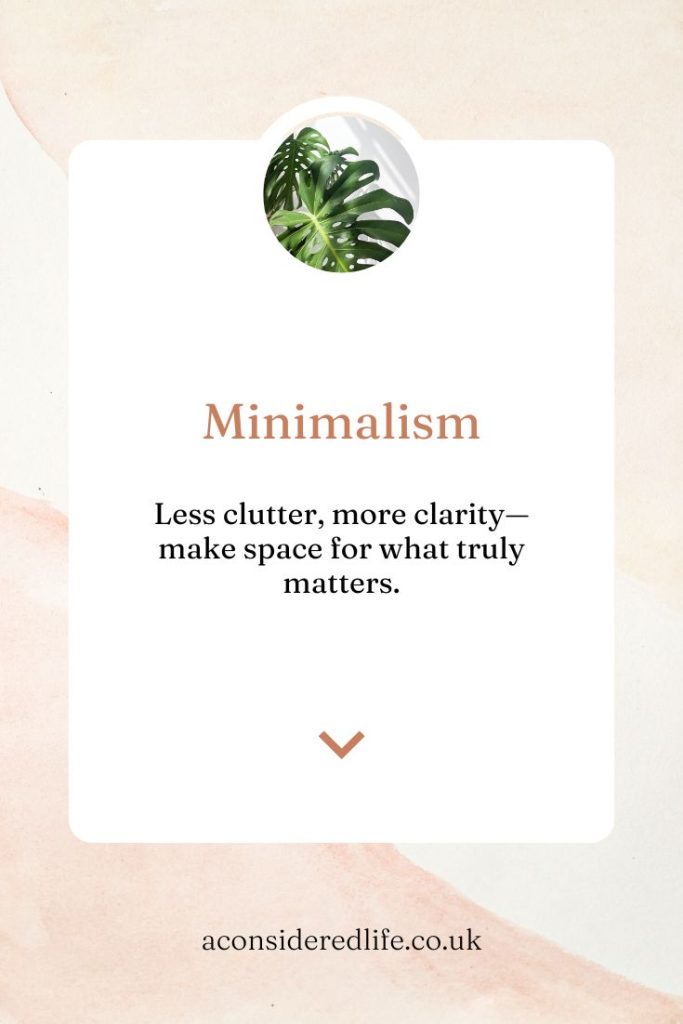Conscious Intentions and Sustainability in Minimalism: Creating an Ecological Lifestyle

A Shift Towards Sustainable Living
In a world grappling with climate change and resource depletion, the movement towards conscious intentions and sustainability has never been more crucial. As families and individuals across Nigeria seek to reduce their environmental impact, minimalism emerges as a powerful approach that connects lifestyle simplicity with ecological responsibility.
So, what does it mean to live an ecological lifestyle? Let’s explore some key principles that can significantly contribute to a more sustainable future:
- Decluttering: This process involves removing excess items that contribute to waste—from old electronics that clutter up homes to clothing that goes unused. An example can be seen in community clean-up events like the “Clean Nigeria” initiative, where families come together to declutter their surroundings, thus reducing waste in landfills and promoting a cleaner environment.
- Mindful consumption: In an era where fast fashion and disposable goods are widely available, choosing quality over quantity becomes imperative. Supporting local artisans who create sustainable products not only boosts the economy but reduces the carbon footprint associated with mass production and imported goods.
- Resourcefulness: This principle focuses on utilizing local materials and services to minimize carbon footprints. For example, using locally sourced food from farmers’ markets reduces transportation emissions. In rural areas of Nigeria, this could mean engaging in community farming, which not only promotes sustainable agriculture but also strengthens local economies.
Embracing minimalism often requires a profound mental shift—an introspection into our desires and values. This isn’t merely about living with fewer possessions; it’s about recognizing what we truly need. For instance, the practice of living with less not only frees up physical space but also mental bandwidth, allowing individuals to focus on what truly matters—such as relationships, community involvement, and personal well-being.
In Nigeria, where cultural heritage and sustainability can intertwine uniquely, many find inspiration in traditional practices. The Yoruba people, for instance, have long embraced sustainable farming techniques, growing food organically and in harmony with nature. Furthermore, local craftsmanship, from beaded jewelry to woven baskets, serves as a testament to the rich culture while promoting sustainable consumer choices.
As we delve deeper into the principles of conscious living and sustainability, it becomes evident that the choices we make today not only shape our personal lives but also influence the broader community. By taking steps towards minimalism, we can foster an ecologically harmonious lifestyle that promotes sustainability and community resilience. Join us as we explore how embracing this lifestyle can lead to a thriving future for both individuals and the planet.

LEARN MORE: This related article may interest you
The Core Tenets of Minimalism and Sustainability
At its essence, minimalism is about stripping away the non-essential to focus on what truly matters. In the context of sustainability, this philosophy aligns perfectly with a conscious approach to environmental impact. With Nigeria’s diverse landscapes and rich natural resources, adopting conscious intentions can pave the way towards an ecological lifestyle that cherishes simplicity and sustainability.
To effectively embrace this lifestyle, we can identify several foundational tenets that contribute to our ecological consciousness:
- Intentional Living: Living intentionally means making choices that align with one’s values and beliefs about environmental stewardship. For instance, Nigerians might choose to live in ways that honor their cultural heritage while adopting more sustainable practices. This can encompass everything from meal preparation using traditional recipes with locally sourced ingredients to celebrating cultural events with an eco-friendly twist.
- Waste Reduction: This principle encourages minimizing waste at every stage—from production to consumption to disposal. In Nigerian households, adopting practices such as composting organic waste or repairing rather than discarding items can significant impact local landfills. Simple steps like growing your food can reduce reliance on store-bought produce, which often uses excessive packaging.
- Eco-friendly Alternatives: The hunt for sustainable alternatives should be at the forefront of consumer choices. For example, instead of purchasing plastic water bottles, communities can invest in reusable containers made from biodegradable materials. Utilizing natural cleaning products, such as vinegar and baking soda, reduces harmful chemicals in our homes and our environment.
Moreover, the application of minimalism in everyday life goes beyond reducing clutter; it fosters a sense of community. Participating in local repair workshops or clothing swaps can promote sharing economies and reduce the need for new products, driving home the importance of resourcefulness. The rise of communal gardens in urban areas serves as a perfect illustration, where families cultivate fruits and vegetables collectively, optimizing resources and nurturing relationships.
For many in Nigeria, sustainability is woven into the fabric of daily existence. By incorporating traditional knowledge and practices into modern minimalism, such as rainwater harvesting or using natural building materials, individuals can create a lifestyle that honors both the environment and cultural heritage. These practices not only maintain ecological balance but also inspire newer generations to uphold the principles of conscious living.
As we navigate towards a minimalist lifestyle, it becomes increasingly evident that intentional choices can inspire profound changes. Embracing these practices allows individuals to reclaim their spaces, lives, and communities while contributing positively towards a more sustainable future. It’s about crafting a shared vision for a healthier planet, one thoughtful decision at a time.
| Advantage | Description |
|---|---|
| Reduced Carbon Footprint | Adopting a minimalist lifestyle significantly lowers the environmental impact by reducing waste and resource consumption. |
| Enhanced Awareness | Living with conscious intentions fosters a deeper understanding of the ecological consequences of our choices. |
| Greater Mindfulness | Minimalism encourages mindful consumption, prompting individuals to prioritize quality over quantity in their purchases. |
| Community Engagement | Sustainability in minimalism often leads to stronger local ties through sharing resources and eco-conscious initiatives. |
The principles of minimalism play a crucial role in shaping a sustainable lifestyle that impacts the environment positively. The concept involves more than just decluttering; it’s about fostering a mindset that values sustainability over excess. By consciously selecting what enters our lives, we not only enhance our well-being but actively contribute to a healthier planet.As individuals embrace minimalism, they discover that intentional living results in higher satisfaction and less stress. By surrounding themselves with only what is essential, practitioners often experience a greater sense of freedom and clarity, which translates into informed choices about their ecological footprint. Furthermore, these conscious efforts can lead to community-oriented actions that amplify the values of sustainability, creating a ripple effect that extends beyond personal choices.
SEE ALSO: Click here to read another article
Transforming Mindsets: The Role of Education and Community Engagement
To truly adopt a lifestyle that intertwines conscious intentions with sustainability in minimalism, education and community engagement are paramount. Understanding the principles behind ecological living empowers individuals to make informed choices that positively impact their surroundings. In Nigeria, educational initiatives focused on sustainability can lead to significant shifts in lifestyle habits, giving rise to a generation more attuned to their ecological footprint.
Educational programs that elucidate the benefits of minimalism within the context of environmental stewardship can take root at various levels—schools, community centers, and even through social media platforms. Local organizations can spearhead campaigns that raise awareness about the effects of consumerism on the planet. Workshops focusing on sustainable practices such as urban gardening, renewable energy usage like solar panels, or even how to create upcycled crafts can evoke enthusiasm and engagement. Community members can gain hands-on experience while fostering a collaborative environment that prioritizes sustainability.
Furthermore, the incorporation of sustainability into school curriculums can nurture a heightened sense of responsibility from an early age. By integrating topics such as climate change, resource conservation, and the importance of biodiversity into subjects like science and social studies, children can learn the value of ecological balance and minimalism as part of a broader life philosophy.
Local Heroes: Leading by Example
In Nigeria, numerous sustainability advocates act as catalysts for change. These individuals embody the principles of conscious living and minimalism, serving as examples for their communities. Social entrepreneurs, for instance, are often at the forefront by launching businesses that emphasize waste reduction, ethical consumption, and ecological awareness.
Local farmers who practice organic agriculture and traditional land stewardship techniques inspire greater appreciation for the environment. They demonstrate how integrating sustainable farming methods not only protects the ecosystem but can also lead to increased food security. This method aligns with the values of minimalism, wherein the focus is placed on consuming what is necessary while respecting the land.
- Community Clean-Up Campaigns: Organizing local clean-up days encourages citizen participation in environmental care, helping foster a collective responsibility for community spaces.
- Cultural Events: Festivals that celebrate traditional cultures while promoting sustainable practices, such as the preservation of local flora and fauna, can heighten communal awareness regarding ecological issues.
- Resource Libraries: Establishing places where community members can borrow tools, clothing, or appliances can greatly reduce consumption and promote a sharing economy that reflects minimalism.
The ripple effect of these educational initiatives and community engagements is profound, as they empower individuals to embrace sustainable choices that collectively enhance ecological health. By sharing knowledge and resources, community members not only nurture their environment but also strengthen social ties, reinforcing the benefits of a minimalist approach.
As Nigerians embrace the values of conscious intentions and sustainable practices, they draw from a rich history of community-based living, initiating meaningful dialogues about waste, consumption, and environmental responsibility. This proactive stance can inspire transformative ecological lifestyles, encouraging not just individual change, but a collective shift towards a more sustainable and minimalistic society.
ADDITIONAL INSIGHTS: Expand your understanding here
Embracing the Future: A Call to Action
In conclusion, the journey towards conscious intentions and sustainability within the framework of minimalism represents not just a shift in personal philosophy but a societal imperative. As we navigate the complexities of modern life in Nigeria, fostering an ecological lifestyle becomes increasingly vital. By adopting minimalistic principles, individuals can mitigate their impact on the environment while cultivating a sense of fulfillment that transcends material possessions.
The integration of sustainable practices into daily life—whether through mindful consumption, community engagement, or education—serves as a cornerstone for creating a resilient society. As we witness the efforts of local champions advocating for ecological awareness and sustainable living, it is clear that these initiatives are not merely options but necessities for enduring change.
Furthermore, as awareness and understanding grow, individuals are empowered to challenge the status quo of consumerism, advocating for a lifestyle that prioritizes quality over quantity. Institutions and organizations play a crucial role in paving the way for sustainability through policies that encourage resource conservation and environmental stewardship.
Ultimately, embracing conscious intentions in the context of minimalism is a collective endeavor. It calls for collaboration, innovative thinking, and bold initiatives that honor our environment while enriching our communities. As we move forward, let us commit to redefining our relationship with consumption and nature, paving the path toward a sustainable future where both individuals and ecosystems thrive.
Engaging in this conversation and taking action today can lead to a dramatic ripple effect, inspiring not just individual change, but a movement towards a more sustainable, minimalistic society for generations to come.


